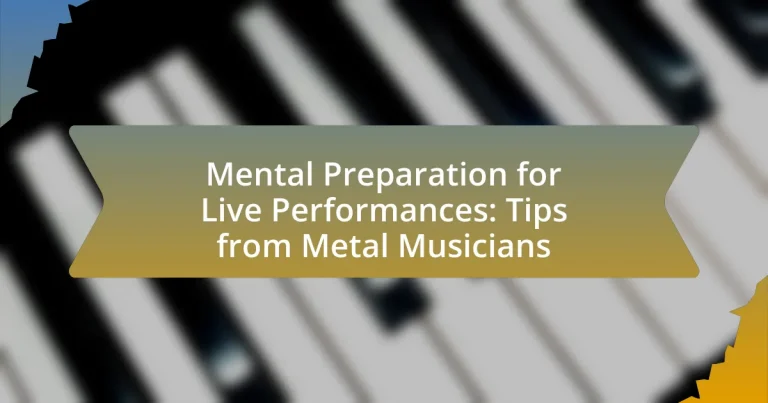Mental preparation for live performances is essential for metal musicians, as it involves psychological strategies that enhance focus, confidence, and performance quality. Techniques such as visualization, deep breathing, and positive affirmations are commonly employed to combat performance anxiety and improve overall execution. The article explores the significance of mental preparation, the psychological challenges faced by musicians, and effective strategies to manage stage fright. Additionally, it highlights the importance of experience and offers practical tips for creating personalized mental preparation routines, supported by research that underscores the benefits of these practices in enhancing performance outcomes.

What is Mental Preparation for Live Performances?
Mental preparation for live performances involves the psychological strategies and techniques that performers use to enhance their focus, confidence, and overall performance quality. This preparation can include visualization, where musicians imagine themselves successfully executing their performance, and positive self-talk to combat anxiety and build self-assurance. Research indicates that mental rehearsal can significantly improve performance outcomes, as evidenced by a study published in the Journal of Sports Sciences, which found that athletes who engaged in mental imagery performed better than those who did not. Thus, effective mental preparation is crucial for musicians to achieve optimal performance during live shows.
Why is mental preparation important for metal musicians?
Mental preparation is crucial for metal musicians because it enhances their performance quality and emotional resilience during live shows. This genre often involves high energy, complex musical arrangements, and intense audience engagement, which can lead to performance anxiety. Studies indicate that mental preparation techniques, such as visualization and mindfulness, can significantly reduce anxiety levels and improve focus, allowing musicians to deliver their best performances. For instance, a study published in the Journal of Music Therapy found that musicians who practiced mental imagery experienced lower stress and higher confidence levels during performances. Thus, effective mental preparation not only boosts performance but also contributes to the overall well-being of metal musicians.
How does mental preparation impact performance quality?
Mental preparation significantly enhances performance quality by improving focus, reducing anxiety, and fostering confidence. Research indicates that athletes and performers who engage in mental rehearsal techniques, such as visualization, experience better outcomes in their performances. For instance, a study published in the Journal of Applied Sport Psychology found that mental imagery can lead to improved motor skills and overall performance, demonstrating that mental preparation directly correlates with enhanced execution during live performances.
What psychological challenges do metal musicians face before a performance?
Metal musicians face significant psychological challenges before a performance, including anxiety, fear of failure, and performance pressure. Anxiety manifests as nervousness or panic, often stemming from the high expectations placed on them by themselves and their fans. Fear of failure can lead to self-doubt, where musicians question their abilities and worry about disappointing their audience. Performance pressure is heightened in the metal genre due to its intense and energetic nature, which can exacerbate feelings of inadequacy. Research indicates that up to 70% of musicians experience performance anxiety, highlighting the prevalence of these challenges in the industry.
What are common mental preparation techniques used by metal musicians?
Common mental preparation techniques used by metal musicians include visualization, deep breathing exercises, and positive affirmations. Visualization involves imagining a successful performance, which helps to reduce anxiety and enhance focus. Deep breathing exercises are employed to calm nerves and maintain composure before going on stage. Positive affirmations are used to boost confidence and reinforce a strong mindset. These techniques are supported by research indicating that mental imagery can improve performance outcomes and that breathing exercises can effectively reduce performance anxiety.
How do visualization techniques enhance performance readiness?
Visualization techniques enhance performance readiness by enabling musicians to mentally rehearse their performances, which improves focus and reduces anxiety. Research indicates that mental imagery activates similar brain regions as actual performance, leading to enhanced muscle memory and confidence. A study published in the Journal of Sports Sciences found that athletes who practiced visualization techniques showed a 20% improvement in performance metrics compared to those who did not. This evidence supports the effectiveness of visualization in preparing musicians for live performances by fostering a strong mental framework and readiness.
What role does mindfulness play in mental preparation?
Mindfulness plays a crucial role in mental preparation by enhancing focus and reducing anxiety. It allows individuals to remain present, which is essential for performers to connect with their music and audience. Research indicates that mindfulness practices, such as meditation, can significantly lower stress levels and improve concentration, leading to better performance outcomes. A study published in the Journal of Applied Psychology found that musicians who engaged in mindfulness training reported increased confidence and reduced performance anxiety, demonstrating the effectiveness of mindfulness in preparing mentally for live performances.

How do metal musicians cope with performance anxiety?
Metal musicians cope with performance anxiety through various techniques such as deep breathing, visualization, and pre-show rituals. Deep breathing helps to calm the nervous system, allowing musicians to focus on their performance rather than their anxiety. Visualization involves mentally rehearsing the performance, which can enhance confidence and reduce fear. Additionally, many musicians engage in pre-show rituals, such as tuning their instruments or performing warm-up exercises, to create a sense of routine and control. These methods are supported by psychological studies indicating that such practices can significantly reduce anxiety levels in performers, leading to improved performance outcomes.
What strategies do musicians use to manage stage fright?
Musicians manage stage fright through various strategies, including deep breathing exercises, visualization techniques, and regular practice. Deep breathing helps to calm the nervous system, allowing musicians to focus better before and during performances. Visualization involves imagining a successful performance, which can enhance confidence and reduce anxiety. Regular practice not only improves skill but also familiarizes musicians with the performance environment, making them more comfortable on stage. Research indicates that these techniques can significantly lower anxiety levels, as evidenced by a study published in the Journal of Music Therapy, which found that musicians who practiced these methods reported a 30% decrease in performance anxiety.
How can breathing exercises help reduce anxiety?
Breathing exercises can significantly reduce anxiety by activating the body’s relaxation response. When individuals engage in controlled breathing techniques, such as deep diaphragmatic breathing, they lower their heart rate and decrease levels of stress hormones like cortisol. Research indicates that these exercises can lead to a measurable reduction in anxiety symptoms; for instance, a study published in the Journal of Clinical Psychology found that participants who practiced breathing exercises reported a 30% decrease in anxiety levels after just a few sessions. This physiological response helps individuals feel calmer and more centered, making breathing exercises an effective tool for managing anxiety, especially in high-pressure situations like live performances.
What is the significance of pre-show rituals for musicians?
Pre-show rituals are significant for musicians as they help establish a mental and emotional state conducive to performance. These rituals can reduce anxiety, enhance focus, and create a sense of routine that prepares musicians for the demands of live shows. Research indicates that rituals can lead to improved performance outcomes by fostering confidence and reducing stress levels, which are critical in high-pressure environments like live concerts. For instance, a study published in the Journal of Experimental Psychology found that engaging in pre-performance routines can significantly lower anxiety and improve overall performance quality.
How does experience influence mental preparation?
Experience significantly enhances mental preparation by providing musicians with practical knowledge and coping strategies for performance anxiety. Musicians who have performed live multiple times develop a deeper understanding of their emotional responses and can better manage stress, leading to improved focus and confidence during performances. Research indicates that experienced performers often utilize visualization techniques and pre-performance routines, which have been shown to reduce anxiety and enhance performance quality. For instance, a study published in the Journal of Applied Sport Psychology found that athletes who engaged in mental imagery reported lower anxiety levels and higher performance outcomes, demonstrating the effectiveness of experience in shaping mental preparation strategies.
What lessons do seasoned musicians learn about mental preparation?
Seasoned musicians learn that mental preparation is crucial for performance success. They understand the importance of visualization techniques, which help them mentally rehearse their performances, reducing anxiety and enhancing confidence. Research indicates that visualization can improve performance outcomes, as seen in studies like those conducted by Dr. Richard Suinn, which demonstrate that athletes and performers who visualize their success tend to perform better. Additionally, seasoned musicians recognize the value of establishing a pre-performance routine, which can create a sense of familiarity and control, further alleviating performance anxiety. This routine often includes warm-up exercises, breathing techniques, and positive affirmations, all of which contribute to a focused and calm mindset before going on stage.
How can newer musicians benefit from the experiences of veterans?
Newer musicians can benefit from the experiences of veterans by gaining insights into effective mental preparation techniques for live performances. Veterans often share strategies that help manage performance anxiety, such as visualization and breathing exercises, which are crucial for maintaining focus and composure on stage. For instance, a study published in the Journal of Music Therapy highlights that musicians who practice visualization techniques report lower anxiety levels and improved performance outcomes. By learning from veterans, newer musicians can adopt these proven methods, enhancing their confidence and stage presence during live shows.

What are the best practices for effective mental preparation?
The best practices for effective mental preparation include visualization, routine establishment, and mindfulness techniques. Visualization involves mentally rehearsing the performance, which has been shown to enhance confidence and reduce anxiety, as evidenced by studies indicating that athletes and performers who visualize their success often achieve better outcomes. Establishing a consistent routine helps create a sense of familiarity and control, which can alleviate performance-related stress. Mindfulness techniques, such as deep breathing and meditation, have been proven to improve focus and emotional regulation, allowing performers to stay present and manage nerves effectively. These practices collectively contribute to a stronger mental state, ultimately enhancing performance quality.
How can musicians create a personalized mental preparation routine?
Musicians can create a personalized mental preparation routine by identifying specific mental techniques that enhance their focus and reduce performance anxiety. This can include visualization exercises, where musicians imagine themselves successfully performing, which has been shown to improve confidence and reduce stress (Cumming & Hall, 2002). Additionally, incorporating breathing exercises can help regulate anxiety levels, as controlled breathing has been linked to improved mental clarity and calmness (Brown et al., 2013). Establishing a consistent pre-performance ritual, such as warming up physically and mentally, can also create a sense of familiarity and readiness, which is crucial for optimal performance.
What elements should be included in a mental preparation plan?
A mental preparation plan should include goal setting, visualization techniques, relaxation strategies, and routine development. Goal setting helps define clear objectives, which can enhance focus and motivation. Visualization techniques allow performers to mentally rehearse their performance, improving confidence and reducing anxiety. Relaxation strategies, such as deep breathing or mindfulness, help manage stress and maintain composure. Routine development establishes a consistent pre-performance process, which can create a sense of familiarity and control. These elements collectively contribute to improved mental readiness and performance outcomes.
How can musicians evaluate the effectiveness of their mental preparation?
Musicians can evaluate the effectiveness of their mental preparation by assessing their performance outcomes and self-reported confidence levels before and after rehearsals or live shows. Specifically, they can track metrics such as the consistency of their performance, their ability to manage anxiety, and their overall satisfaction with their execution. Research indicates that musicians who engage in structured mental preparation techniques, such as visualization and mindfulness, report higher levels of performance quality and reduced performance anxiety (Kenny, 2011, “The Psychology of Music Performance Anxiety,” Psychology of Music). This correlation suggests that effective mental preparation can be quantitatively measured through both subjective experiences and objective performance results.
What resources are available for musicians seeking to improve their mental preparation?
Musicians seeking to improve their mental preparation can utilize various resources, including books, online courses, and mental health apps. For instance, “The Musician’s Way” by Gerald Klickstein offers practical strategies for mental focus and performance anxiety management. Additionally, platforms like Coursera provide courses on performance psychology, which can enhance mental resilience. Mental health apps such as Headspace and Calm offer guided meditations specifically designed for performers, helping to reduce stress and improve concentration. These resources are validated by research indicating that mental preparation significantly enhances performance quality and reduces anxiety in musicians.
What books or courses focus on mental preparation for performers?
Books and courses that focus on mental preparation for performers include “The Inner Game of Tennis” by W. Timothy Gallwey, which emphasizes mental focus and overcoming self-doubt, and “Performing Under Pressure” by Hendrie Weisinger, which provides strategies for managing stress and anxiety in high-stakes situations. Additionally, courses like “The Art of Performance” offered by various online platforms teach techniques for mental resilience and visualization tailored for performers. These resources are widely recognized for their effectiveness in enhancing mental readiness among artists and athletes.
How can musicians find support groups or mentors for mental preparation?
Musicians can find support groups or mentors for mental preparation by utilizing online platforms, local music communities, and professional organizations. Online platforms such as social media groups, forums, and websites dedicated to musicians often host discussions and resources for mental health support. Local music communities, including music schools and venues, frequently organize workshops and networking events where musicians can connect with experienced mentors. Additionally, professional organizations like the Musicians’ Union or the American Federation of Musicians provide resources and networking opportunities that can lead to mentorship relationships. These avenues are effective as they create environments for sharing experiences and strategies, which are crucial for mental preparation in live performances.
What practical tips can enhance mental preparation for live performances?
To enhance mental preparation for live performances, musicians should practice visualization techniques, which involve mentally rehearsing the performance to build confidence and reduce anxiety. Research indicates that visualization can improve performance outcomes by creating a mental blueprint of success, as evidenced by studies showing that athletes and performers who visualize their actions tend to perform better than those who do not. Additionally, establishing a pre-performance routine can help musicians focus and create a sense of familiarity, further reducing stress. Techniques such as deep breathing, positive affirmations, and mindfulness exercises can also contribute to a calm and focused mindset, as supported by psychological studies highlighting the benefits of these practices in performance settings.

